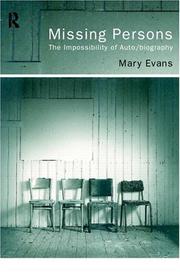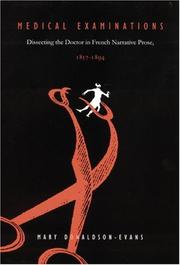| Listing 1 - 8 of 8 |
Sort by
|

ISBN: 1134857128 1280360976 9786610360970 0203009711 9780203009710 9780415099752 0415099757 9780415099769 0415099765 0415099757 0415099765 6610360979 9781134857074 9781134857111 9781134857128 1929490313 9781929490318 9781280360978 Year: 1999 Publisher: London New York Routledge
Abstract | Keywords | Export | Availability | Bookmark
 Loading...
Loading...Choose an application
- Reference Manager
- EndNote
- RefWorks (Direct export to RefWorks)
Biography as a literary form. --- Autobiography. --- Autobiographies --- Autobiography --- Egodocuments --- Memoirs --- Biography as a literary form --- Biography --- Authorship --- Prose literature --- History and criticism --- Technique
Book
ISBN: 128245305X 1441171738 9781441171733 9781282453050 9781847062062 1847062067 1441179682 9781441179685 Year: 2009 Publisher: London New York Continuum
Abstract | Keywords | Export | Availability | Bookmark
 Loading...
Loading...Choose an application
- Reference Manager
- EndNote
- RefWorks (Direct export to RefWorks)
From its growth in Europe in the nineteenth century, detective fiction has developed into one of the most popular genres of literature and popular culture more widely. In this monograph, Mary Evans examines detective fiction and its complex relationship to the modern and to modernity. She focuses on two key themes: the moral relationship of detection (and the detective) to a particular social world and the attempt to restore and even improve the social world that has been threatened and fractured by a crime, usually that of murder. It is a characteristic of much detective fiction that the dete
Book
ISBN: 1317673034 1138803391 1317673042 1315770652 1138780510 132209439X 9781317673040 9781317673033 Year: 2015 Publisher: London New York Routledge, Taylor and Francis
Abstract | Keywords | Export | Availability | Bookmark
 Loading...
Loading...Choose an application
- Reference Manager
- EndNote
- RefWorks (Direct export to RefWorks)
Tolstoy's Anna Karenina is considered by many to be one of the greatest novels ever written. This study of its morally ambiguous protagonist, Anna, discusses Tolstoy's troubled relation to the feminine in terms of the fantasies, hopes, and fears that she represents. In Reflecting on Anna Karenina, first published in 1989, Mary Evans presents an original, feminist reading of Anna's life and times for both students and the general audience. She argues that Anna is the embodiment of all those female characteristics that so captivated Tolstoy, and which he felt so compelled to punish in his writin
Women in literature. --- Sex role in literature. --- Feminism in literature. --- Tolstoy, Leo, --- Characters --- Women.
Book
ISBN: 9789042025042 9042025042 9401206643 1441601058 9781441601056 9789401206648 Year: 2009 Volume: 325 Publisher: Amsterdam Rodopi
Abstract | Keywords | Export | Availability | Bookmark
 Loading...
Loading...Choose an application
- Reference Manager
- EndNote
- RefWorks (Direct export to RefWorks)
Some eighteen film directors from France to the United States, Germany to India, have applied themselves to the task of adapting Madame Bovary to the screen. Why has Flaubert’s 1857 classic novel been so popular with filmmakers? What challenges have they had to meet? What ideologies do their adaptations serve? Madame Bovary at the Movies seeks to answer these questions, avoiding value judgments based on the notion of fidelity to the novel. In-depth analyses are reserved for the studio films of Renoir, Minnelli and Chabrol and the small-screen adaptation of Fywell. As the first book-length examination of the Madame Bovary adaptations, this volume, in addition to its pedagogical applications, will be a useful reference for scholars of literature and film and for those interested in the burgeoning field of adaptation studies.
Bovary, Emma (Fictitious character) --- In motion pictures --- Flaubert, Gustave, --- Flaubert, Gustave, 1821-1880. --- Film --- Flaubert, Gustave --- Emma Bovary (Fictitious character) --- In motion pictures. --- Flaubert, Gustaw, --- Flober, Gi︠u︡stav, --- Fu-lou-pai, --- Fu, Lou-pai, --- Fu-lou-pai, Chü-ssu-tʻa fu, --- Fuloubai, --- Phlōmper, Gkystav, --- Phlōmper, Goustauos, --- Флобер, Гюстав, --- פלאבער, ג. --- פלאבער, גוסטאוו, --- פלובר, גוסטאב --- 福樓拜, --- Flūbir, Gūstāv, --- Flūbir, Gūstāw, --- فلوبر، گوستاو --- Bovary, Emma (Fictitious character) - In motion pictures --- Flaubert, Gustave, - 1821-1880 - Film adaptations --- Flaubert, Gustave, - 1821-1880. - Madame Bovary --- Flaubert, Gustave, - 1821-1880

ISBN: 0803202474 9780803202474 0803266286 9780803266285 Year: 2000 Publisher: Lincoln University of Nebraska Press
Abstract | Keywords | Export | Availability | Bookmark
 Loading...
Loading...Choose an application
- Reference Manager
- EndNote
- RefWorks (Direct export to RefWorks)
Medical fiction --- Literature and medicine --- Physicians in literature. --- French fiction --- Medicine and literature --- Medicine --- History and criticism. --- History --- History and criticism
Book
ISBN: 303060649X 3030606481 Year: 2020 Publisher: Cham, Switzerland : Springer,
Abstract | Keywords | Export | Availability | Bookmark
 Loading...
Loading...Choose an application
- Reference Manager
- EndNote
- RefWorks (Direct export to RefWorks)
“A fascinating gem of a book on the history of respectability as a form of social control, bursting with historical insights about how women have been judged, and the enduring impacts of cultures of judgement in shaping unequal lives today.” Imogen Tyler, Professor and Head of the Department of Sociology, Lancaster University, UK This book studies the ways in which the assessment of being or not being ‘respectable’ has been applied to women in the UK in the past one hundred and fifty years. Mary Evans shows how the term ‘respectable’ has changed and how, most importantly, the basis of the ways in which the respectability of women has been judged has shifted from a location in women’s personal, domestic and sexual behaviour to that of how women engage in contemporary forms of citizenship, not the least of which is paid work. This shift has important social and political implications that have seldom been explored: amongst these are the growing marginalisation of the validation of the traditional care work of women, the assumption that paid work is implicitly and inevitably empowering and the complex ways in which respectability and conformity to highly sexualised conventions about female appearance have been normalised. Making Respectable Women makes use of archive material to show how the changing definition of a moral and social concept can have an impact on both the behaviour and the choices of individuals and the operations of institutional power. It will be of interest to students and scholars across the humanities and social sciences. Mary Evans is Leverhulme Emeritus Professor, Department of Gender Studies, London School of Econimics and Political Science, UK .
Sociology. --- Social history. --- Social structure. --- Social inequality. --- Communication. --- Biotechnology. --- Gender Studies. --- Social History. --- Social Structure, Social Inequality. --- Media and Communication. --- Chemical engineering --- Genetic engineering --- Communication, Primitive --- Mass communication --- Sociology --- Egalitarianism --- Inequality --- Social equality --- Social inequality --- Political science --- Democracy --- Liberty --- Organization, Social --- Social organization --- Anthropology --- Social institutions --- Descriptive sociology --- Social conditions --- Social history --- History --- Social theory --- Social sciences
Book
ISBN: 3319945203 331994519X Year: 2019 Publisher: Cham : Springer International Publishing : Imprint: Palgrave Macmillan,
Abstract | Keywords | Export | Availability | Bookmark
 Loading...
Loading...Choose an application
- Reference Manager
- EndNote
- RefWorks (Direct export to RefWorks)
This book analyses the ways in which twenty-first century detective fiction provides an understanding of the increasingly complex and often baffling contemporary world — and what sociology, as a discipline, can learn from it. Conventional sociological accounts of fiction generally comprehend its value in terms of the ways in which it can illustrate, enlarge or help to articulate a particular social theory. Evans, Moore, and Johnstone suggest a different approach, and demonstrate that by taking a group of detective novels, we can unveil so far unidentified, but crucial, theoretical ideas about what it means to be an individual in the twenty-first century. More specifically, the authors argue that detective fiction of the last forty years illuminates the effects of urban isolation and separation, the invisibility of institutional power, financial insecurity, and the failure of public authorities to protect people. In doing so, this body of fiction traces out the fault-lines in our social arrangements, rehearses our collective fears, and captures a mood of restless disquiet. By engaging with detective stories in this way, the book revisits ideas about the promise and purpose of sociology.
Social sciences. --- Social sciences-Philosophy. --- Literature, Modern-20th century. --- Popular Culture. --- Popular Social Sciences. --- Social Structure, Social Inequality. --- Cultural Studies. --- Social Theory. --- Contemporary Literature. --- Popular Culture . --- Culture, Popular --- Mass culture --- Pop culture --- Popular arts --- Communication --- Intellectual life --- Mass society --- Recreation --- Culture --- Behavioral sciences --- Human sciences --- Sciences, Social --- Social science --- Social studies --- Civilization --- Social structure. --- Social inequality. --- Cultural studies. --- Social sciences—Philosophy. --- Literature, Modern—20th century. --- Literature, Modern—21st century. --- Organization, Social --- Social organization --- Anthropology --- Sociology --- Social institutions --- Egalitarianism --- Inequality --- Social equality --- Social inequality --- Political science --- Democracy --- Liberty --- Equality.
Book

ISBN: 9780748683437 9780748683444 0748683445 9780748683451 0748683453 0748683437 1784023213 1322980748 Year: 2022 Publisher: Edinburgh
Abstract | Keywords | Export | Availability | Bookmark
 Loading...
Loading...Choose an application
- Reference Manager
- EndNote
- RefWorks (Direct export to RefWorks)
Introduces readers to a wide range of research methods for use in English StudiesGBS_insertPreviewButtonPopup(['ISBN:9780748683437','ISBN:9780748683444']);With a revised Introduction and with all chapters revised to bring them completely up-to date, this new edition remains the leading guide to research methods for final-year undergraduates, postgraduates taking Masters degrees and PhDs students of 19th- and 20th-century Literary Studies.Written by a range of distinguished contributors, each chapter centres on one particular method, offering both concrete practical advice on how to utilise it and exploring some of the methodological issues that are involved in the use of the particular method. The chapters cover research methods familiar to English scholars such as textual analysis, as well as those less commonly explored such as visual and quantitative methods, which also contribute significantly to research in English Studies. Other approaches discussed include auto/biographical methods, discourse analysis, interviewing, archival methods, ethnographic methods, oral history, creative writing as a research method, and research using information and communication technologies (ICTS).Key FeaturesOpens students minds to alternative research methodsIntroduces the research methodological vocabulary essential for describing methods used in a thesis and submitting good funding applicationsIntroduces debates surrounding the methods, encouraging professional development and engagement with the overall research context in nineteenth- and twentieth-century English StudiesOffers concrete examples of how methods might be used in English research"
English literature --- Research --- Methodology. --- Literature --- Belles-lettres --- Western literature (Western countries) --- World literature --- Philology --- Authors --- Authorship --- British literature --- Inklings (Group of writers) --- Nonsense Club (Group of writers) --- Order of the Fancy (Group of writers) --- Methodology
| Listing 1 - 8 of 8 |
Sort by
|

 Search
Search Feedback
Feedback About UniCat
About UniCat  Help
Help News
News